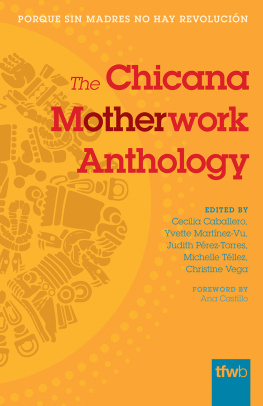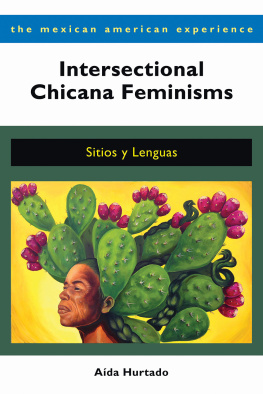Thank you for buying this ebook, published by NYU Press.
Sign up for our e-newsletters to receive information about forthcoming books, special discounts, and more!
Sign Up!
About NYU Press
A publisher of original scholarship since its founding in 1916, New York University Press Produces more than 100 new books each year, with a backlist of 3,000 titles in print. Working across the humanities and social sciences, NYU Press has award-winning lists in sociology, law, cultural and American studies, religion, American history, anthropology, politics, criminology, media and communication, literary studies, and psychology.
The Chicana/o Cultural Studies Forum
NEW YORK UNIVERSITY PRESS
New York and London
www.nyupress.org
2007 by New York University
All rights reserved
Library of Congress Cataloging-in-Publication Data
The Chicana/o cultural studies forum : critical and ethnographic practices/edited by Angie Chabram-Dernersesian.
p. cm.
Includes bibliographical references and index.
ISBN13: 9780814716311 (cloth : alk. paper)
ISBN10: 0814716318 (cloth : alk. paper)
ISBN13: 9780814716328 (pbk. : alk. paper)
ISBN10: 0814716326 (pbk. : alk. paper)
1. Mexican AmericansStudy and teachingCongresses.
2. Mexican AmericansIntellectual lifeCongresses.
3. CultureStudy and teachingUnited StatesCongresses.
I. Chabram-Dernersesian, Angie. II. Title: Chicana cultural studies forum. III. Title: Chicano cultural studies forum.
E184.M5C384 2007
305.86872073dc22 2007023002
New York University Press books are printed on acid-free paper, and their binding materials are chosen for strength and durability.
Manufactured in the United States of America
c 10 9 8 7 6 5 4 3 2 1
p 10 9 8 7 6 5 4 3 2 1
Contents
Introduction
Chicana/o Cultural Studies and Beyond:
The Practices of Cultural Studies in Our Worlds
Angie Chabram-Dernersesian
Session One
A Question of Genealogies: Always Already (Chicana/o) Cultural Studies?
Session Two
Chicana/o Cultural Studies: Marking Interdisciplinary Relationships and Conjunctures
Session Three
Staking the Claim: Introducing Applied Chicana/o Cultural Studies
Intercession
Reflections on The Chicana/o Cultural Studies
Forum Sessions (One, Two, Three)
Angie Chabram-Dernersesian
Session Four
More Practices of Cultural Studies in Our Worlds
(Asian-American, American, Latina/o, Latin American, Subaltern, African American)
Session Five
Conclusion: Our Critical Pathways
Angie Chabram-Dernersesian
Postscript
Preview of Selected Chicana/o Cultural Studies
Print Culture
Angie Chabram-Dernersesian
Acknowledgments
Like other works which carry the traces of grassroots, this book was a labor of love that required the help, support, and participation of many people. I would like to thank all the participants of the forums sessions, including Mary Pat Brady, Michelle Habell-Palln, Rosaura Snchez, Beatrice Pita, Ramn Garca, Yvonne Yarbro-Bejarano, C. Ondine Chavoya, Lisa Snchez Gonzlez, Raymond Rocco, Ada Hurtado, Alvina Quintana, Sonia Saldvar-Hull, Chela Sandoval, Richard Chabrn, Jos David Saldvar, Renato Rosaldo, Kevin Johnson, Alejandra Elenes, Rafael Prez-Torres, Carlos Vlez-Ibez, Alicia Arrizn, George Mariscal, Vicki Ruiz, Emma Prez, David Romn, Mike Soldatenko, Rosa Linda Fregoso, Herman Gray, Lisa Lowe, George Lipsitz, Kent Ono, John Beverley, Ruth Behar, Frances Aparicio, Larry Grossberg, Wahneema Lubiano, and Jos Manuel Valenzuela Arce. There are many more cultural studies practitioners that can be included in future conversations and forumsgo for it! As one practitioner says, Step on the Accelerator! My goal was to open up the arena, not close the book on the topic, and I am grateful to Eric Zinner and Emily Park at New York University Press and to the anonymous reviewers (gracias!), who helped to facilitate the publication of this cultural studies intervention.
I would also like to thank Zar Juan Dernersesian, to whom this work is appropriately dedicated, for his consistent, unwavering, and energetic support of me as I moved through the different phases of this project and through various personal and professional transitions. Zar, I cannot thank you enough for your courage, presence, and optimism, which made all the difference to me as I assumed and completed this substantial project. On the original home front, I would also like to acknowledge Angie G. Chabram and Yolanda Butler, who continue to provide important models of womanhood and survival and to spice up my life in so many ways; Richard Chabrn, who introduced me to cultural studies and Stuart Hall; Rafael Chabrn, who took me to UC Berkeley, where I attended college and graduated in the late seventies; and Matthew, who has given us all a reason to smile and to hope.
I would also like to recognize the professors in the Spanish Section of the Literature Department at UC San Diego in the 80s (primarily Rosaura Snchez, Carlos Blanco-Aguinaga, Joseph Sommers, and Marta Snchez), who recognized the importance of Chicana/o literature and criticism and helped to place a number of professors in these fields at major universities. For me, the beginnings of Chicana/o cultural studies can be traced to the critical dialogues that were born and made possible there at the Spanish Section at UCSD, between classes, oral presentations, conferences, and many productive informal gatherings that united friends and colleagues alike.
Additionally, the seeds for this bookand the complementary The Chicana/o Cultural Studies Reader (Routledge: 2006)were planted with my collaboration with the journal, Cultural Studies, and Larry Grossberg, in particular. Suffice it to say that this collaboration was a creative force in my recent dialogues with cultural studies.
Finally, I am grateful for the support I received from these friends, colleagues, and family members during the completion of this work: Michelle Habell-Palln, Deborah Vargas, Emma Garca, Kevin Johnson, Ruth Frankenberg, Roberto Rodrguez, Ral Villa, Clara Lomas, Sergio de la Mora, Sonia Saldvar-Hull, Mary Romero, Judy Newton, Susan Kaiser, Adela de la Torre, Melissa Chabrn Bowie, and Gabriel Chabrn. My everpresent canine daughter Kyra (keech dog of the schiperkee breed) also deserves honorable mention. She provided unconditional love and solidarity, often staying up with me until the wee hours of the morning.
The production of this book was made possible by the financial support of the Chabram-Dernersesian household, the Deans Book Fund at UC Davis, The Chicana Latina Institute, and the staff support of Celina Rodrguez, Kathy Hayden, Connie Zeiller, Alicia Rodrguez, Mara Perea, and Johnathan Martnez.
The Chicana/o Cultural Studies Forum




